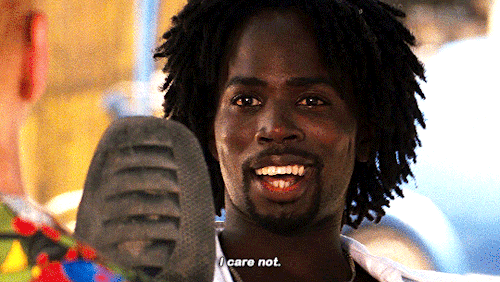@chaiandpages
@chaiandpages

how i look at my characters existing in peace knowing that their happiness is just pages away from being taken
More Posts from Little-infj-cafe and Others
How to show emotions
Part VIII
How to show helplessness
slightly open mouth
downturned mouth
eyes slightly more open
being hesitant in their movements
shrugging shoulders
wringing their hands
crossed arms to protect themself
buckling of the legs, becoming instable
speaking softly and shaky
How to show optimism
openly smiling
relaxed face
bright, attentice eyes
steady and natural eye contact
open and upright posture
energetic and animated movements
speaking in an upbeat and positive tone
walking with a spring in their step
walking confidently
How to show anticipation
bright and open eyes
looking around
sweaty palms
trembling hands
heart racing
fidgeting with their entire body
crossing and uncrossing one's legs
having restless legs, rocking them
drumming with their fingers
bouncing on one's toes
shifting from one foot to the other
pacing around
fussing with clothes
How to show amusement
eyes twinkling with mirth
chuckling
bursting out in laughter
eye contact to share their amusement
being open and relaxed
a genuine smile
raised eyebrows
crinkling around the eyes
tilting of the head
slapping their thigh
playfully nudging other characters
How to show respectfulness
standing tall with good posture
maintain steady, appropriate eye contact
avoiding direct staring to not make them feel uncomfortable
speaking in a calm and measured tone
showing attentiveness by listening actively
using polite language and manners, not interrupting or talking over anyone
no crossing of arms and relaxed hands
More: How to write emotions Masterpost
If you like my blog and want to support me, you can buy me a coffee or become a member! And check out my Instagram! 🥰

Each week (or so), we'll highlight the relevant (and sometimes rage-inducing) news adjacent to writing and freedom of expression. This week:
Inkitt’s AI-powered fiction factory
Inkitt started in the mid-2010s as a cozy platform where anyone could share their writing. Fast forward twenty twenty-fuckkkkk, and like most startups, it’s pivoted hard into AI-fueled content production with the soul of an algorithm.

Pictured: Inkitt preparing human-generated work for an AI-powered flume ride to The Unknown.
Here’s how it works: Inkitt monitors reader engagement with tracking software, then picks popular stories to publish on its premium app, Galatea. From there, stories can get spun into sequels, spinoffs, or adapted for GalateaTV… often with minimal author involvement. Authors get an undisclosed cut of revenue, but for most, it’s a fraction of what they’d earn with a traditional publisher (let alone self-publishing).
“'They prey on new writers who have no idea what they’re doing,' said the writer of one popular Galatea series."
Many, many authors have side-eyed or outright decried the platform as inherently predatory for years, due to nebulous payout promises. And much of the concern centers on contracts that don’t require authors’ consent for editorial changes or AI-generated “additions” to the original text.
Now, Inkitt has gone full DiSrUpTiOn, leaning heavily on generative AI to ghostwrite, edit, generate audiobook narration, and design covers, under the banner of “democratizing storytelling.” (Bullshit AI? In my democratized storytelling platform? It’s more likely than you think.)

Pictured: Inkitt’s CEO looking at the most-read stories.
But Inkitt’s CEO doesn’t seem too concerned about what authors think: “His business model doesn’t need them.”

The company recently raised $37 million, with backers including former CEOs of Sony, Penguin, and HarperCollins, proving once again that publishing loves a disruptor… as long as it disrupts creatives, not capital. And more AI companies are mushrooming up to chase the same vision: “a vision of human-created art becoming the raw material for AI-powered, corporate-owned content-production machines—a scenario in which humans would play an ever-shrinking role.”
(Not to say we predicted this, but…)
Welcome to the creator-industrial complex.

Publishers to AI: Stop stealing our stuff (please?)
Major publishers—including The New York Times, The Washington Post, The Guardian, and Vox Media—have launched a "Support Responsible AI" campaign, urging the U.S. government to regulate AI's use of copyrighted content.
Like last month's campaigns by the Authors Guild and the UK's Society of Authors, there's a website where where you can (and should!) contact your representatives to say, “Hey, maybe stop letting billion-dollar tech giants strip-mine journalism.”
The campaign’s ads carry big mood slogans like “Stop AI Theft” and “AI Steals From You Too” and call for legislation that would force AI companies to pay for the content they train on and clearly label AI-generated content with attribution. This follows lobbying by OpenAI and Google to make it legal to scrape and train on copyrighted material without consent.
The publishers assert they are not explicitly anti-AI, but advocate for a “fair” system that respects intellectual property and supports journalism.
But… awkward, The Washington Post—now owned by Jeff Bezos—has reportedly already struck a deal with OpenAI to license and summarize its content. So, mixed signals.
Still, as the campaign reminds us: “Stealing is un-American.”
(Unless it’s profitable.)

#WarForever
We at Ellipsus love a good meme-turned-megaproject. Back in January, the-app-formerly-known-as-Twitter user @lolt64 tweeted a cryptic line about "the frozen wastes of europa,” the earliest reference to the never-ending war on Jupiter’s icy moon.
A slew of bleak dispatches from weary, doomed soldiers entrenched on Europa’s ice fields snowballed (iceberged?) into a sprawling saga, yes-and-ing with fan art, vignettes, and memes under the hashtag #WarForever.
It’s not quite X’s answer to Goncharov: It turns out WarForever is some flavor of viral marketing for a tabletop RPG zine. But the internet ran with it anyway, with NASA playing the Scorcese of the stars.

In a digital hellworld increasingly dominated by AI slopification, data harvesting, and “content at scale,” projects like WarForever are a blessed reminder that creativity—actual, human creativity—perseveres.
Even on a frozen moon. Even here.

Let us know if you find something other writers should know about, (or join our Discord and share it there!)
- The Ellipsus Team xo

Five business days
"Coffee wakes you up instantly. Tea takes, like, five business days to kick in."
"Tea is calming. Coffee makes you jittery and aggressive."
"Maybe I like being jittery and aggressive."
"…That explains so much."
lovely character. i need him to finally break down sobbing clutching his chest like it'll stop the pain crumpling to the floor begging God to either help him or let him die

Reactions to...
Reactions to… getting betrayed
Reactions to… getting kissed
Reactions to… the other being jealous
Reactions to… seeing someone again after a long time
Reactions to… being stuck somewhere
Reactions to… a love confession
If you like my blog and want to support me, you can buy me a coffee or become a member! And check out my Instagram! 🥰
Download this easy DIY clothing repair guide (only 10 pages) from Uni of Kentucky

link to PDF
https://fcs-hes.ca.uky.edu/sites/fcs-hes.ca.uky.edu/files/ct-mmb-147.pdf



Romeo + Juliet (1996) dir. Baz Luhrmann
Wizards are not naturally immortal. In fact, creating their own form of immortality is their graduation thesis.
Im honestly a little frightened by the current situation. Thank you, everyone, who added to this. I also used to just scroll past these websites, but I’m most certainly going to try and use a VPN now.
Still scared. But I can be scared and protected now.
Farewell online privacy
Writing Prompt #12
I’m sorry I could not love you the way you needed me to.
-
 fallen-grigori liked this · 1 month ago
fallen-grigori liked this · 1 month ago -
 friendly-writes reblogged this · 1 month ago
friendly-writes reblogged this · 1 month ago -
 claylikeslambs liked this · 1 month ago
claylikeslambs liked this · 1 month ago -
 overwhelmedfernfrond liked this · 1 month ago
overwhelmedfernfrond liked this · 1 month ago -
 fangirlmyth liked this · 1 month ago
fangirlmyth liked this · 1 month ago -
 elleldoe reblogged this · 1 month ago
elleldoe reblogged this · 1 month ago -
 emoboy07 liked this · 1 month ago
emoboy07 liked this · 1 month ago -
 pretty-moon-cry liked this · 1 month ago
pretty-moon-cry liked this · 1 month ago -
 phoenixofthegreenwood liked this · 1 month ago
phoenixofthegreenwood liked this · 1 month ago -
 dovahhmonn liked this · 1 month ago
dovahhmonn liked this · 1 month ago -
 asubax liked this · 1 month ago
asubax liked this · 1 month ago -
 linn1234567890987654321 liked this · 1 month ago
linn1234567890987654321 liked this · 1 month ago -
 crybaby1230 liked this · 2 months ago
crybaby1230 liked this · 2 months ago -
 rynasubumbra liked this · 2 months ago
rynasubumbra liked this · 2 months ago -
 motionsickgayboy liked this · 2 months ago
motionsickgayboy liked this · 2 months ago -
 onigiriico liked this · 2 months ago
onigiriico liked this · 2 months ago -
 alikhawrites liked this · 2 months ago
alikhawrites liked this · 2 months ago -
 snackamunchies liked this · 2 months ago
snackamunchies liked this · 2 months ago -
 wanderingkyoko liked this · 2 months ago
wanderingkyoko liked this · 2 months ago -
 raventhisintrest liked this · 2 months ago
raventhisintrest liked this · 2 months ago -
 the-golden-comet liked this · 2 months ago
the-golden-comet liked this · 2 months ago -
 dramatiquechipmunk liked this · 2 months ago
dramatiquechipmunk liked this · 2 months ago -
 hailtothepumpkinqueen reblogged this · 2 months ago
hailtothepumpkinqueen reblogged this · 2 months ago -
 the-coven-anime reblogged this · 2 months ago
the-coven-anime reblogged this · 2 months ago -
 ithurtsyoufarmorethanithurtsme liked this · 2 months ago
ithurtsyoufarmorethanithurtsme liked this · 2 months ago -
 brennabunnie liked this · 2 months ago
brennabunnie liked this · 2 months ago -
 turtleduckie-is-the-goat reblogged this · 2 months ago
turtleduckie-is-the-goat reblogged this · 2 months ago -
 sideblog-sillies reblogged this · 2 months ago
sideblog-sillies reblogged this · 2 months ago -
 cherryri liked this · 2 months ago
cherryri liked this · 2 months ago -
 alistairsprayerwarrior liked this · 2 months ago
alistairsprayerwarrior liked this · 2 months ago -
 uxienya reblogged this · 2 months ago
uxienya reblogged this · 2 months ago -
 uxienya liked this · 2 months ago
uxienya liked this · 2 months ago -
 jaskiersfaetallute reblogged this · 2 months ago
jaskiersfaetallute reblogged this · 2 months ago -
 jaskiersfaetallute liked this · 2 months ago
jaskiersfaetallute liked this · 2 months ago -
 janetbrownwrites reblogged this · 2 months ago
janetbrownwrites reblogged this · 2 months ago -
 janetbrown711 liked this · 2 months ago
janetbrown711 liked this · 2 months ago -
 starsfic reblogged this · 2 months ago
starsfic reblogged this · 2 months ago -
 my-jokes-are-my-armour reblogged this · 2 months ago
my-jokes-are-my-armour reblogged this · 2 months ago -
 my-jokes-are-my-armour liked this · 2 months ago
my-jokes-are-my-armour liked this · 2 months ago -
 pippinoftheshire reblogged this · 2 months ago
pippinoftheshire reblogged this · 2 months ago -
 pippinoftheshire liked this · 2 months ago
pippinoftheshire liked this · 2 months ago -
 jinglebellrockstars liked this · 2 months ago
jinglebellrockstars liked this · 2 months ago -
 writingamongther0ses reblogged this · 2 months ago
writingamongther0ses reblogged this · 2 months ago -
 janacariad reblogged this · 2 months ago
janacariad reblogged this · 2 months ago -
 gotta-bail-my-quails liked this · 2 months ago
gotta-bail-my-quails liked this · 2 months ago -
 antoniachuu reblogged this · 2 months ago
antoniachuu reblogged this · 2 months ago -
 antoniachuu liked this · 2 months ago
antoniachuu liked this · 2 months ago -
 flamemom1213 liked this · 2 months ago
flamemom1213 liked this · 2 months ago

Hello! Welcome to my silly little corner of the internet.
233 posts